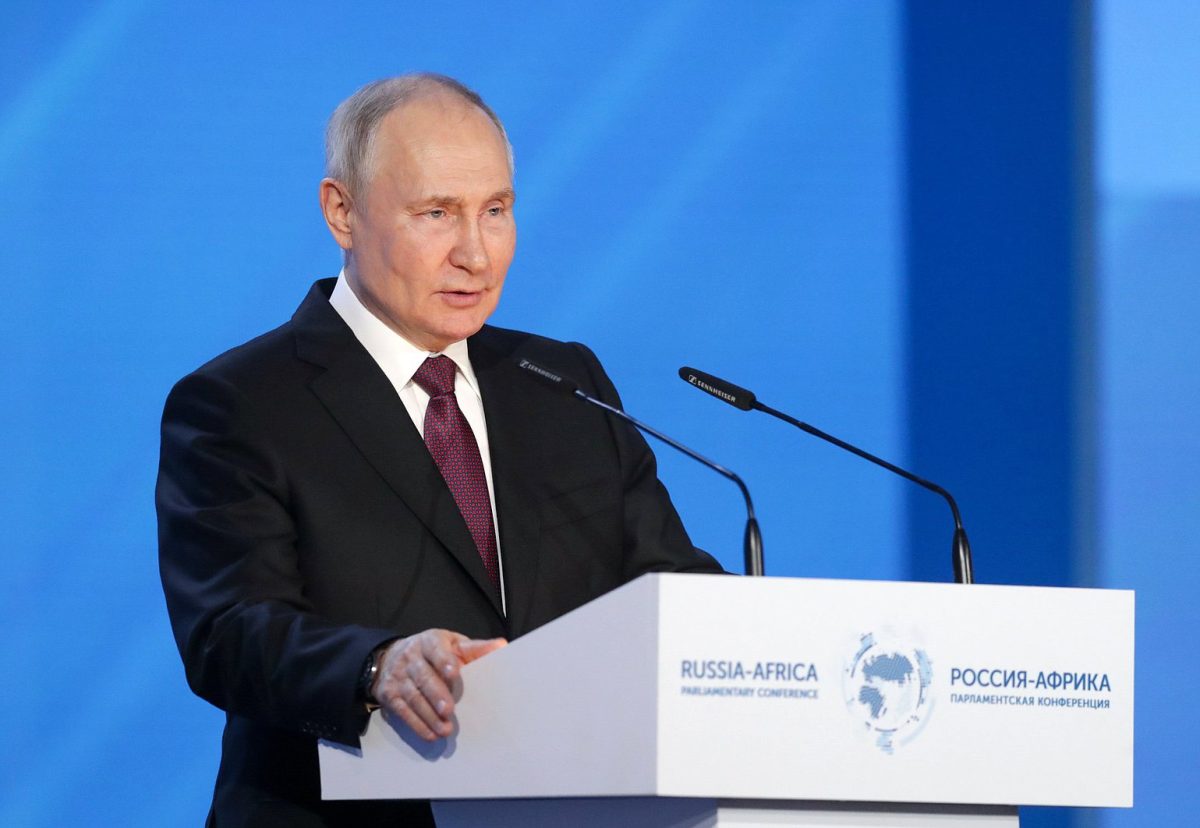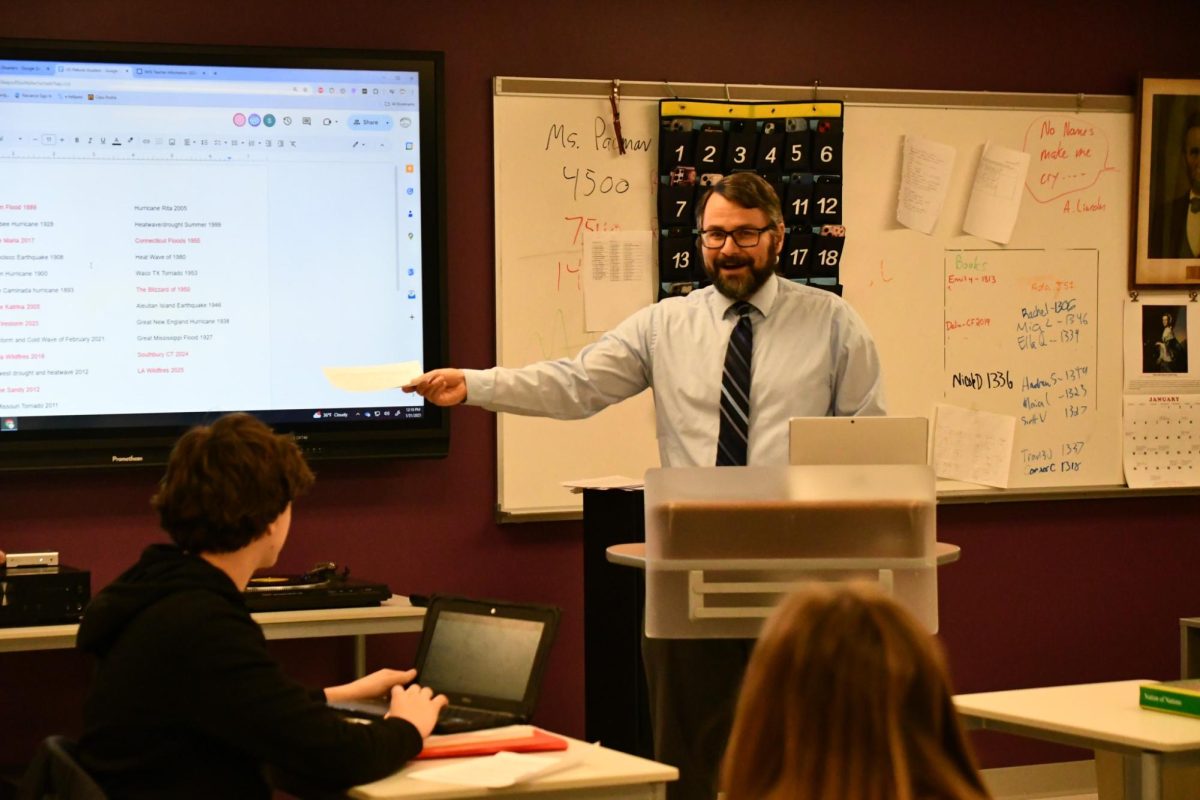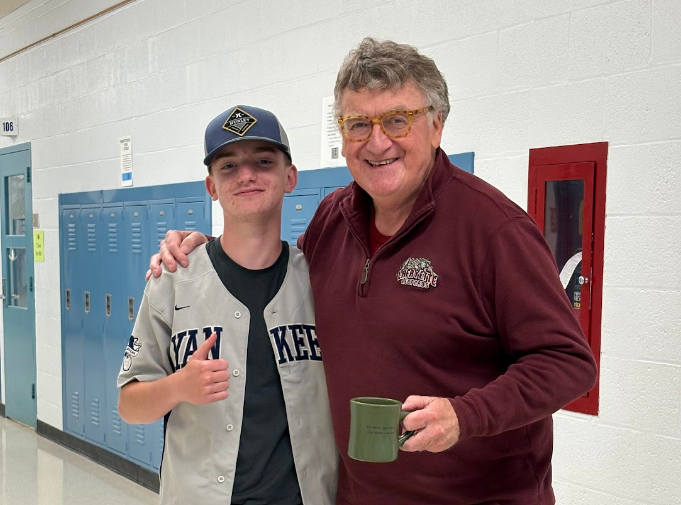Editor’s note: The following article was completed by Gillian Fernandes ’26, a student in Nonnewaug’s AP Seminar course.
On February 16, 2024, Vladimir Putin’s biggest political opposition leader, Alexei Navalny, died in the Arctic prison colony. His widow, Yulia Navalnaya has bravely pledged to take on Navalny’s role of leading the opposing politicians. In her own words, “By killing Alexei, Putin killed half of me, half of my heart, and half of my soul. But I still have the other half, and it tells me that I have no right to give up. I will continue Alexei Navalny’s cause” (Hartog and Goryashko 2024). Navalnaya must tread carefully to avoid falling into the arms of the Russian Government, known as the Kremlin, who will toy with her like a puppet until her last breath. Russia is known for its cruelty against critics and Navalnaya will not be spared. It is imperative that the report addresses Russia’s poor practice of human rights.
According to the U.S. Department of State, reporting Russia’s malpractice regarding inalienable rights, they found many opposing politicians and activists dead with little to no further investigation. Timur Kuashev, a critic of Russia’s invasion of Crimea, was found dead in 2014; Ruslan Magomedragimov, activist for Lezgin ethnic minority group, was found dead in 2015; Boris Nemtsove, an opposing politician, was found dead in 2015; Vladimir Kara-Murza, an opposing politician, was poisoned in 2015 and 2017; and Salman Tepsurkayev, a Chechen activist and moderator of 1ADAT (a social media platform) was kidnapped, humiliated, tortured, and killed in 2020 (U.S. Department of State, 2022).
The urgency of this situation cannot be ignored. Russia’s strict anti-protest laws make it very difficult to put a dent in the wall. OVD-Info, a human rights group reporting repressions in Russia, corroborates this by stating that as of March 20, 2024, 19,855 anti-war protestors were detained after February 24 and 916 criminal cases were made against anti-war critics (OVD-Info 2024). To avoid this, Navalnaya must plan every step she takes. One path for her, in particular, has been partially paved by previous protesters in the U.S.. Navalnaya must take into consideration the strategies of rebellion of two protesters, Edward Snowden and Elouise Cobell, who fought against the government using different tactics. Edward Snowden released classified information regarding the recordings of people’s internet usage. He said, “I do not want to live in a world where everything I do and say is recorded” (Thomas and Chaleff 2017). Elouise Cobell, however, worked within the frameworks of law to achieve justice for Blackfeet Indians.
Although Snowden’s and Cobell’s approaches may be drastically different, Russia’s complex structure of laws forces Navalnaya to apply both of their strategies. Snowden’s push of truth will help Navalnaya achieve justice despite the deceitful formats of the government, while Cobell’s ways of working in the frameworks will help Navalnaya stay just out of reach of the Kremlin and gain the respect of other countries to gain potential allies. Understanding the happy balance between disobeying the law and working within it is crucial for Navalnaya’s survival.
Edward Snowden
Edward Snowden used to work for the Central Intelligence Agency (CIA) and National Security Agency (NSA). In a National Security Archive, they discussed The Guardian, a British newspaper, that had leaked classified U.S. documents to support their articles regarding the abuse of data collection in the U.S.. One Top Secret document disclosed, demanding Verizon to provide an electronic copy of data collected regarding call records, was called the “Secondary Order.” This then forced the U.S. to release the extremely censored version of the “Primary Order.” It was later revealed that The Guardian’s source of information was Edward Snowden (Richelson 2013). Snowden’s tactic of silently releasing information to foreign countries is wise. Countries prioritize their reputation and find being a “laughing stalk” distasteful.
When the U.S. was in the spotlight for abusing data collection, they took immediate action to explain themselves. If Navalnaya can find more tangible evidence convicting Putin of his crimes, the world will slowly turn against him, allowing her to gain allies. Moreover, if she can get information from someone within the Kremlin, she can acquire vital information to use against Putin. Unfortunately, Navalnaya, due to her reputation, cannot be the one to take a government position. The Office of Public Affairs reveals the downsides of utilizing a sensitive position by stating that in September 2019, the United States filed a lawsuit against Edward Snowden for violating non-disclosure documents through the publication of Permanent Record (without having it reviewed by the agencies) and 56 specific speeches. The court chose in favor of the U.S. and Edward Snowden had to give up 5.2 million dollars to the U.S. (Office of Public Affairs 2020). This was only a small price to pay to bring light to the abuse of information that is collected by the government. Navalnaya must be prepared to face monetary consequences such as this one, especially as Putin tries to defame her.
Snowden did not have any companions to protect him, thus making him more vulnerable to the government. Navalnaya must take this mistake into consideration and push to make trustworthy alliances with people within Russia and outside of the country. Snowden himself emphasizes the benefit that “the idea that they can lock us out and there will be no change is no longer tenable. Everyone accepts these programmes were not effective, did not keep us safe and, even if they did, represent an unacceptable degradation of our rights” (Jacobs and Ackerman 2015). This simple quote demonstrates a lot about Snowden. It demonstrates his true intentions of doing it for the greater good. Although he was heavily discouraged by many, he trudged through to bring light to an issue. Snowden did not let others manipulate him even under extreme circumstances. This moral courage must be used by Navalnaya if she wants to accomplish anything. Despite the guidelines for Snowden to work within, his bold rebellion allowed for information to be revealed immediately. Moreso, it prevented the government from silencing him and not alerting the public. Russia is known for its silencing tactics and this boldness must be used by Navalnaya.
Elouise Cobell
Elouise Cobell was constantly silenced and degraded. Nonetheless, Daniel Cobb, who has a Ph.D. in History from University of Oklahoma (2003), a M.A. in History from University of Wyoming (1998), and a B.A. in History plus Sociology minor from Messiah College (graduated cum laude, 1996), defends Elouise Cobell by elucidating that she was interested in the financial state of her Blackfeet Tribe since she was young, persistently asking the BIA questions before becoming the Treasurer of the Blackfeet Tribe (Cobb 2017). Cobell’s obsession with finances ensured she was knowledgeable on the topic. Her strategy was derived by going by the book. Sifting through the irregularities and finding the mismanagement of Indian fundings allowed for Cobell to win her lawsuit and work within the frameworks of law. Although the lawsuit took 13 years, she relentlessly fought for justice.
Melinda Janko, producer/director of the documentary A Small Measure of Justice (which entails Elouise Cobell’s fight for justice and filing the largest class-action lawsuit in the U.S.), parallels this by declaring, “Over the many years we knew each other, Cobell and I would often talk about the lawsuit. Even in those times when victory seemed far away she would say, ‘I know I am doing the right thing’” (Janko 2013). Cobell’s unwavering determination is what led her to the finish line. Yulia Navalnaya must follow her steps and never give up despite the difficulties and blockades she may encounter. Cobell, at a Settlement Agreement, clarifies, “Yes, we could prolong our struggle, fight longer, and, perhaps one day, know–down to the penny–how much individual Indians are owed…But we are nevertheless compelled to settle now by the sobering reality that…This settlement can begin to provide hope and a much needed measure of justice” (U.S. Government Printing Office 2009). In other words, although Navalnaya should not give up, she must know when to accept a small measure of justice. Navalnaya should not expect to be the solution to Russians’ imprisonment, she is only the start of it. Yulia Navalnaya may not get the exact outcome she wants, but something that would benefit most people and at least improve conditions.
Combined Potential
Both Edward Snowden and Elouise Cobell were successful in their own ways. However, with the extremity of restrictions on inalienable rights in Russia, Navalnaya is going to need both. Referring back to utilizing government positions, Jeffrey Bossert Clark, the Acting Assistant Attorney General of the Civil Division, states, “We will pursue those who take advantage of sensitive positions in government to profit from the classified information learned during their government service” (Office of Public Affairs 2020). Keeping in mind that this is only the United States, Navalnaya must be extremely careful. Whoever she selects as her mole will have to put their life at stake. It may be safer for Navalnaya to insinuate that there is a rat to turn Putin’s friends against one another. With this diversion, Navalnaya can buy precious time to help Russians protest against him. As for protesting and raising awareness, Elouise Cobell alleges “I knew from experience that if I told him I was a banker he would just nod his head and stare out the window. So I told him I was reforming the U.S. government…was a good way for me to get people talking about this lawsuit” (Janko 2013). This simple strategy of slight exaggeration allowed for Cobell to gain traction. Similarly, Navalnaya must choose her words carefully to gain popularity among Europeans and Russians to bring light about Putin’s evil reign. Navalnaya is the backbone of the rebellion in Russia. If she breaks, everything else will. In an interview in Germany with Russian journalist Yury Dud, she explains, “The main feeling I had was that I shouldn’t relax, show weakness. If I fall apart, everyone will fall apart” (Hartog and Goryashko 2024). Yulia Navalnaya must be strong to carry the opposition on her shoulders and pull through with her plan. If she fails, hope will soon dissipate. Yulia Navalnaya must use her allies to her advantage, choose her words carefully, and prevent her blood from seeping into the water.
Conclusion
Edward Snowden’s and Elouise Cobell’s approaches of going against the U.S. government can aid Yulia Navalnaya in what steps should be taken to go against Putin’s regime. Snowden strategically worked outside of the law to reveal sensitive information he believed would get censored. Although it may seem rash, it allowed for people to instantly know about the illegal surveillance the government was taking part in. Elouise Cobell, however, worked within the frameworks of law to gain the respect of others and have allies at her disposal. It is paramount to acknowledge that Putin cannot be negotiated with. As Yulia Navalnaya said, “If you really want to defeat Putin, you have to become an innovator…You aren’t dealing with a politician but with a bloody mobster. The most important thing is the people close to Putin, his friends, associates, and keepers of the mafia’s money” (European Parliament 2024). She must use these critical strategies learned to quickly come up with solutions to evade the Kremlin’s attempts to control her.
Lyubov Sobol, a lawyer and longtime Navalny employee who is exiled in Berlin, said in an interview with Politico “She has shown great courage because it is clear that she will be the next target for the Kremlin’s smear campaigns. They will try to break her” (Hartog and Goryashko 2024). In order to stall Putin’s attempts, she must work quickly, diligently, never question her morals, never give up, accept small victories, articulate her point in a way that others talk about it, and never show her weakness. Moreso, she must learn to improvise to evade Putin’s attempts to defame her and destroy her. Although Alexei Navalny has passed, the political war between Russia and its people has not ceased. Yulia Navalnaya will overcome him if it is the last thing she does. Her bravery already has and will continue to spark hope in others in finally being free.









